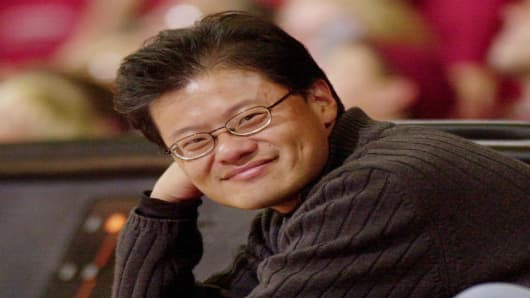I knew that headline would catch your attention, and it should when you're trying to figure out the vagaries of Yahoo and its dealings with Microsoft, Time-Warner, News Corp. and any of the other suitors, or vultures, out there trying to become part of the company's future.
I've spoken to a number of employees and executives this past week inside the company and invariably, the question comes up: How's Jerry doing? What's he like day to day? And almost across the board, the same answer comes up: Resigned, relaxed, and much different than he's been. Not driven, focused, bitter, eager or angry. Resigned and relaxed.
In fact, one executive says there's a marked change in Yang's demeanor. Another tells me the change is noticeable, and a good thing. He sees his fate, his company's fate, and he's comfortable with it.
That's because, as I've said, Jerry Yang won. No one will care about anything other than the last three years, but you should. In this what-have-you-earned-for-me-lately kinda world, no one wants to remember the history of what got Yahoo to a point where it's worth $40-plus billion, but they should.
Sure, there's a pitched battle for control of his company; sure there's the daunting prospect of his life ahead without Yahoo . But that's the thing: Yahoo will always be with Jerry Yang, and Yang always with Yahoo, along with his co-founder David Filo.
The start-up story is well known: a Stanford dorm room project back in 1994 and first named "Jerry's Guide to the World Wide Web," incorporated a year later as Yahoo!, the darling of Silicon Valley, the first breath in that dot com balloon, and since then, staggering growth, boasting 130 million unique users a month, a half-billion registered users around the globe, 3.4 billion page views a day, the world's most visited website.
And those are the likely reasons why Microsoft is ready to shell out over $40 billion to buy it. Has Yahoo been worth more during its history? Absolutely. Remember those heady days when shares topped $475? But success breeds competition and it also breeds growth. Yahoo became corporate, and got bogged down in its own success.
Google began eating away at its dominance and the faster competition appeared, the more paralyzed Yahoo became. Innovation kept percolating in Sunnyvale, but the pace of execution slowed to a crawl. The company spurred things like messaging, online email, photo-sharing, online communities, and so much more. That's what happens when you create a new industry. I spawns creativity, inspiration, and competition from thousands of inventive minds looking to do better what you already started. Which is a very good thing indeed.
Yahoo's legacy, no matter who snaps them up, will be tainted by the last few years of its life when the company was mired in confusion, indecision and a stock that hurt a lot of shorter-term investors. But make no mistake: the company's overall legacy in the Silicon Valley and on the world wide web is rich and solid. Jerry Yang, as the CEO who turned the lights on, and will likely be the one who turns the lights off at Yahoo as an independent company, should rest assured that he won. Creating enormous value where there once was none; and as one of the founding fathers of one of the most exciting industries going.
We called Jerry this morning. As you might expect, he isn't talking.
I know we shouldn't use sheer wealth to measure success but Jerry's, and David's, is hardly insignificant. Jerry holds 54 million shares worth about $1.5 billion. David owns 78 million worth $2.2 billion. You employ thousands. Success, sure. Jerry, don't be "resigned." Relax. Have a little perspective. By any measure other than those used on Wall Street, you won.
Questions? Comments? TechCheck@cnbc.com


